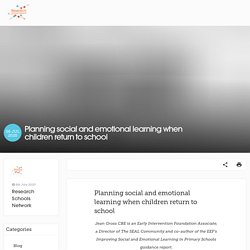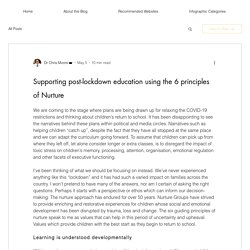

Planning social and emotional learning when children return to school. Jean Gross CBE is an Early Intervention Foundation Associate, a Director of The SEAL Community and co-author of the EEF’s Improving Social and Emotional Learning in Primary Schools guidance report.

When children return to school after staying at home for many months, they will bring with them accumulated experiences of anxiety, frustration, low mood and in some cases trauma and bereavement. There will be ongoing economic stressors and more children affected by poverty. There will also be feelings of excitement, and hope. It will be a time therefore when children need more than ever to draw on the five core social and emotional competencies described in the EEF’s Social and Emotional Learning Guidance Report: self-awareness, self-management, social awareness, relationship skills and responsible decision making. To help them, schools may want to consider increasing their focus on social and emotional learning (SEL) in parallel with academic learning. Supporting post-lockdown education using the 6 principles of Nurture. We are coming to the stage where plans are being drawn up for relaxing the COVID-19 restrictions and thinking about children’s return to school.

It has been disappointing to see the narratives behind these plans within political and media circles. Narratives such as helping children “catch up”, despite the fact that they have all stopped at the same place and we can adapt the curriculum going forward. To assume that children can pick up from where they left off, let alone consider longer or extra classes, is to disregard the impact of toxic stress on children’s memory, processing, attention, organisation, emotional regulation and other facets of executive functioning.
I’ve been thinking of what we should be focusing on instead. We’ve never experienced anything like this “lockdown” and it has had such a varied impact on families across the country. Learning is understood developmentally · We may need to initially focus on providing positive and fulfilling experiences. Key References. Supporting post-lockdown education using the 6 principles of Nurture. Five ways to help children heal when schools reopen – Mary Meredith. We may not yet know when schools will reopen for all, but one thing is certain; they will need to be therapeutic.

We are living a financial catastrophe; a public health emergency; a mass community trauma. And trauma always falls hardest on still-developing children. The notion that they are naturally resilient is supported by none of the research evidence. Such wishful thinking only hampers proactive attempts to promote healing and recovery. Being fit for purpose must now mean placing wellbeing front and centre and evaluating every element of school policy and practice through that lens.
The good news is that the potential of schools to heal traumatised children, or to prevent an escalation of need, is huge. In her letter to the chancellor, the children’s commissioner outlines a “cocktail of secondary risks” bearing down on vulnerable families, from poverty to homelessness to domestic violence. Hold a formal act of remembrance as a community Some children will have lost family members. 2020 COVID 19 US children article pdf 4 2. Coronavirus research bite 1 self management for anxiety. MHOF At HomeMy wellbeing during coronavirus [ Children and young people ] Survey. This survey is for:Young people aged 11 to 19Young people with SEND aged 11 to 25This survey is for all young people in these age groups.
![MHOF At HomeMy wellbeing during coronavirus [ Children and young people ] Survey](http://cdn.pearltrees.com/s/pic/th/wellbeing-coronavirus-children-219813718)
You may be at school, college, university. You might be home schooled, waiting for a school place, or you may have already left education or started work or training. Why am I being asked to fill in this survey? Coronavirus has impacted on the lives of us all and in many different ways. Some good, and some not so good. Will my information be kept confidential?
All responses are anonymous, which means we do not ask for your name or other information that might identify you to us or to other people. Where can I get help? Within the survey there is lots of information of where you can go to get support.The survey will ask you about how you are feeling, and how your family is coping with the lockdown. SJS Week 6 Assembly (Vimeo)